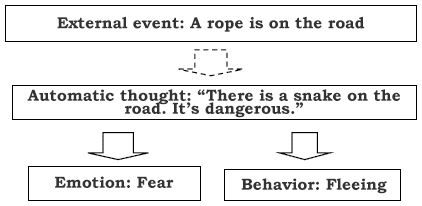In this column, I would like to present a brief argument about the similarity between narrative economics, cognitive behavioral therapy, and spiritual teaching.
1. Narrative economics
In my view, the most crucial event in Japanese economics in 2021 was the publication of the Japanese language version of "Narrative Economics" by Dr. Robert Shiller [1]. My understanding of narrative economics is as follows; stories or narratives which are created from our thoughts often deviate from reality, and in spite of this deviation, some of the stories or narratives rapidly come to be shared among many people like a virus and have a significant impact on the economy as a whole.
Shiller's argument of Narative Economics reminds me of several phenomenan in Japan. During the asset bubble era in the 1980s, some people around me really believed that real estate prices in Japan would never fall. I guess that many people had similar beliefs, and this shared belief, which turned out to be incorrect in retrospect, seem to have led to rising prices of real estate and stocks until the collapse of the bubble. Another possible narrative is Japan's so-called lost (two? three?) decades. Although I don't have clear evidence, one of the main causes of Japan's stagnant economy for more than two decades since the 1990s may be that Japanese people's shared and unfounded pessimistic expectations for Japan's economic future led to unnecessary reductions in investment and consumption, causing the stagnation of the Japanese economy. Recently, Japan seems to be facing another narrative issue; many people including politicians seem to believe that there is no problem in issuing government bonds for many years without exercising discipline.
2. Cognitive behavioral therapy
Narrative economics may be challenging for economists because it deals with human thoughts which are directly unobservable. However, thoughts have been widely addressed in psychiatry and clinical psychology for several decades. It began with "cognitive therapy" which was created by the American psychiatrist Dr. Aaron Beck [2]. Cognitive therapy was combined with behavioral therapy and they are now usually referred to collectively as cognitive behavioral therapy. It is one of the few evidence-based psychotherapies in use [3, 4].
On the essence of cognitive therapy, I here quote an interesting description by Dr. Ohno Yutaka who learned cognitive therapy directly from Dr. Beck:
"While we see ourselves as thinking realistically, we actually live in a virtual reality we have created. As our virtual reality deviates farther from actual reality, suffering emerges. When we are suffering, it is important for us to consciously engage with reality and examine our thoughts." (Ohno, Yutaka "Mental Health Science," Nikkei Shimbun, November 23, 2021, p.25)
Thoughts are the key to cognitive therapy. The word "cognitive" comes from the Latin word "cogitatio" which means "thoughts," which is where the term "cognitive therapy" [5] comes from. The thought referred to here is the "voices in our head," the almost ceaseless stream of uncontrolled monologue or conversation occurring inside our heads, rather than logical thinking. The cognitive model (in which thoughts that deviate from reality trigger negative emotions such as depression and anxiety and inappropriate behaviors) is the basis for cognitive therapy. These thoughts automatically arise irrespective of our intention, thus they are called "automatic thoughts." Figure 1 indicates a case in which a person mistakes a rope in the street for a snake. The person seeing the rope develops an automatic thought that there is a snake on the road, has a fear response, and flees the site to avoid the risk.

As indicated by the cognition model, thoughts and emotions are packaged; when we have negative emotions such as anxiety, anger and depression, we also have some automatic thoughts which correspond to the emotions. This implies that "narrative economics" is also "emotional economics."
3. Spiritual teaching
While narrative economics and cognitive therapy are intellectual products that were created in the past several decades, the idea that narratives and automatic thoughts exert influence on human suffering and social phenomena has been discussed in religious and spiritual literature, from the most ancient to the most modern teachings and practices. For example, spiritual teacher Eckhart Tolle claims that the voices in people's heads (frequently referred to as "mind" and "ego," as well as "thoughts") torture people and trigger various social problems [6, 7]. By reading his books, you may find that his claims have similarities with the claims made in narrative economics and cognitive behavioral therapy.
4. Final remark
Addressing our thoughts, which almost always deviate from reality, is one of the keys for us to live happily and survive as a species. Narrative economics and cognitive behavioral therapy have paved the way for interdisciplinary awareness on the importance of shedding light on our thoughts as an academic object. As the next step, it would be required for people in academia to explore how to deal with our thoughts. In these explorations, learning from religious or spiritual practices and bringing them into academic disciplines after removing their mystical aspects may be informative. Actually, these explorations have already been initiated. For example, mindfulness, which originated from Buddhism, has been brought into psychiatry and psychology. It has been pointed out that cognitive behavioral therapy has similarities to Buddhism or Taoism [8]. In his quest to determine the nature of human thoughts, Dr. Beck, the creator of cognitive therapy, maintained close communication with Dalai Lama XIV, the supreme leader of Tibetan Buddhism. We need to develop a courageous attitude that allows us to break through barriers between disciplines, as Dr. Beck did.


